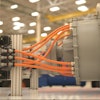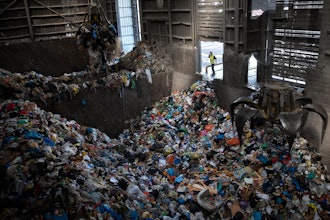NEW ORLEANS (AP) -- A prayer, if one is so inclined, probably is in order for the 1,946 people who still draw their paychecks from the General Motors Corp. assembly plant in Shreveport.
It wasn't long ago that GM was expected to be a major economic player in Louisiana for years to come. The auto giant had pushed more than $1.5 billion in improvements into the plant and was building then-popular mid-size pickups and, for those not bothered by $2-a-gallon gasoline, the Hummer H3.
This fall, courtesy of Shreveport, GM is supposed to roll out the Hummer H3T pickup.
But $4-a-gallon gasoline has altered pictures of prosperity with warp speed. GM in Shreveport is a good example, perhaps leaving the 377 hourly workers there who recently took buyouts grinning from ear to ear, or at least breathing a sigh of relief.
For GM, it's been a summer of trying to retool -- and not in the sense of equipping an assembly plant to handle a new line of vehicles. It's a case of trying to stay out of the corporate sinkhole.
A previously announced cutback in truck production has been doubled -- along with the promise of more job cuts -- and GM is shopping its Hummer brand around to buyers.
So far, Shreveport has been spared the fate of assembly plants in Janesville, Wis.; Moraine, Ohio; Oshawa, Ontario; and Toluca, Mexico, which already had been scheduled for closure. Now, GM says some of those plants -- it hasn't identified which ones -- will be shuttered even earlier.
GM also is chopping away at its white-collar work force. Shreveport currently has 190 salaried workers who have to wonder: GM says 20 percent of that group will vanish in the United States and Canada.
Some industry analysts say that GM probably will keep Hummer -- and go with a previously announced option of redesigning the line with more fuel efficiency in mind. Others suggest that a foreign manufacturer probably could do better with Hummer, such as India's Tata Motors Ltd., which recently paid equally troubled Ford Motor Co. $2.3 billion for the Jaguar and Land Rover brands.
It's something of a tradition in Louisiana, when a major employer starts going South, to blame the state -- its tax system, a business-unfriendly attitude or whatnot -- for the problem. But in this case, it started with GM, as well as the other U.S. automakers, who simply have not come up with the reputation of fuel-efficient vehicles -- whether gas prices are low or high -- that foreign competitors enjoy with American consumers.
What are economic development officials doing about this?
Richard Bremer, president of the Shreveport Chamber of Commerce, said local and state economic development officials were in contact with GM and monitoring the company's situation. "I don't know exactly where it's going," he said.
GM apparently is still trying to figure that out, too.
It's not that auto manufacturing is a dying business in the South. Far from it. Following Nissan Motor Co.'s move to set up shop in Smyrna, Tenn., in 1983, foreign automakers have been flocking to the region. Toyota, BMW, Honda and Kia are either in or about to come in.
Talking about a kick in the seat of the pants: On the day GM announced its latest corporate slashing, Volkswagen picked Chattanooga, Tenn., for its U.S. assembly plant that will employ about 2,000 workers and make a new midsize sedan.
Louisiana got far back in this race in the 1990s -- the days of then-Gov. Mike Foster's laissez faire approach to economic development, if he had a definable one at all -- and is still looking for a way to get back in.
Meanwhile, Louisiana State University economist Loren Scott said the size of GM's recent investment in Shreveport may be at least something of a salvation. GM, which has confirmed the production of four new models, through 2009, and has 15 others in the works, could shift some of that production to Louisiana, Scott said.
"So, my guess is that it would be one of the last plants to close," Scott said.
At least for now, and especially if the current jumbled economic conditions and high fuel prices continue, that may be GM Shreveport's only real hope.
EDITOR'S NOTE: Alan Sayre is the New Orleans-based business writer for The Associated Press.






















